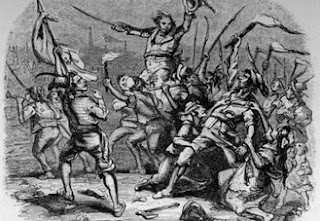"The history of a kid is one part fact, two parts legend, and three parts snowball."
This is only one of many favorite lines out of Jerry Spinelli's classic
Maniac Magee. In an era where kids want the entertainment steroids of racing comedic moneymakers, I found Maniac's underrated story, often passed on the shelves, to be a masterfully captured snippet of what childhood used to be.
The author sits the reader down to tell them the story of "the legend of Two Mills." Supposedly, one day some kid with flapping sneaker soles entered the racially-divided town (a fictional setting based on Norristown, Pennsylvania), and became known as Maniac Magee. How? Oh, just by running the rail, getting the Beale kids to stop coloring on everything, skipping school, hitting home runs off of bully McNab, untangling the local pizza parlor's famous knot, and by kissing a bull (actually a baby buffalo... details). But most of all, people remember Maniac for showing them that there was no big difference between East and West other than what difference they wanted to make.
I love this book. I read it a few years back when I first started thinking about going through the Newberys, shortly after I moved to Oklahoma. As a native of Maniac's part of the planet, it warmed me to see names like Conshohocken, King of Prussia, and Valley Forge, and to hear references to Butterscotch Krimpets, minor league baseball, and just general Pennsylvanian culture. Every time I read
Maniac Magee, it's a trip home. Obviously, this won't connect the same way to most readers, but to me it was a personal bonus to an already-great story.
Now, don't be fooled by the title.
Maniac Magee is not a galloping read. It's not as fast as, say, the
Lego Movie or
Maze Runner in the least. It jogs along, but with its strong voice and ability to bring you back to your own childhood days, it holds attention. Yes, it's episodic, and yes, it's sometimes a little hard to believe, but that's the whole point. This is a legend we're reading about, right? :D
Spinelli's greatest achievement, though, is his ability to make his political statements without actually making them. By this, I mean that while other Newbery winners often present their political and moral ideas in an adult to child way, this story processes the consequences of racism right alongside its main character. He's also not afraid to show the resentment of the East Enders and their own discrimination towards Maniac, nor show the unhappy state of the so-called "white trash" life.
This could make for a weighty read. But it doesn't. We see everything through Maniac's eyes, and mostly, he just doesn't understand
why things are the way they are. And eventually, through his so-called "legendary" antics, which he pulls off kindly and without being a jerk in the least, the rest of Two Mills doesn't either.
All this to say, I highly recommend this book. It's a relatively short read, and I'd love to see it make a comeback in popularity.
Rating: Five stars
Recommended reading age: 10+
Favorite characters: Amanda and Maniac
Content for parents: some slight bathroom humor, some "bad" kids are described as smokers and drinkers, another kid (more dramatically than anything else) wishes he were dead.
For more Marvelous Middle Grade Reviews, check out Shannon's blog
here.








































